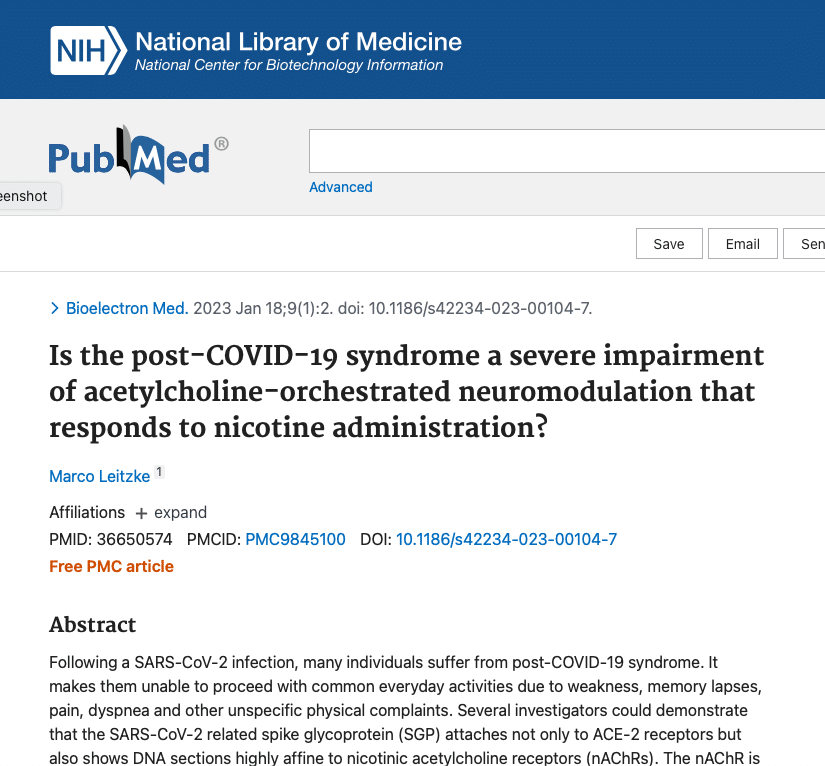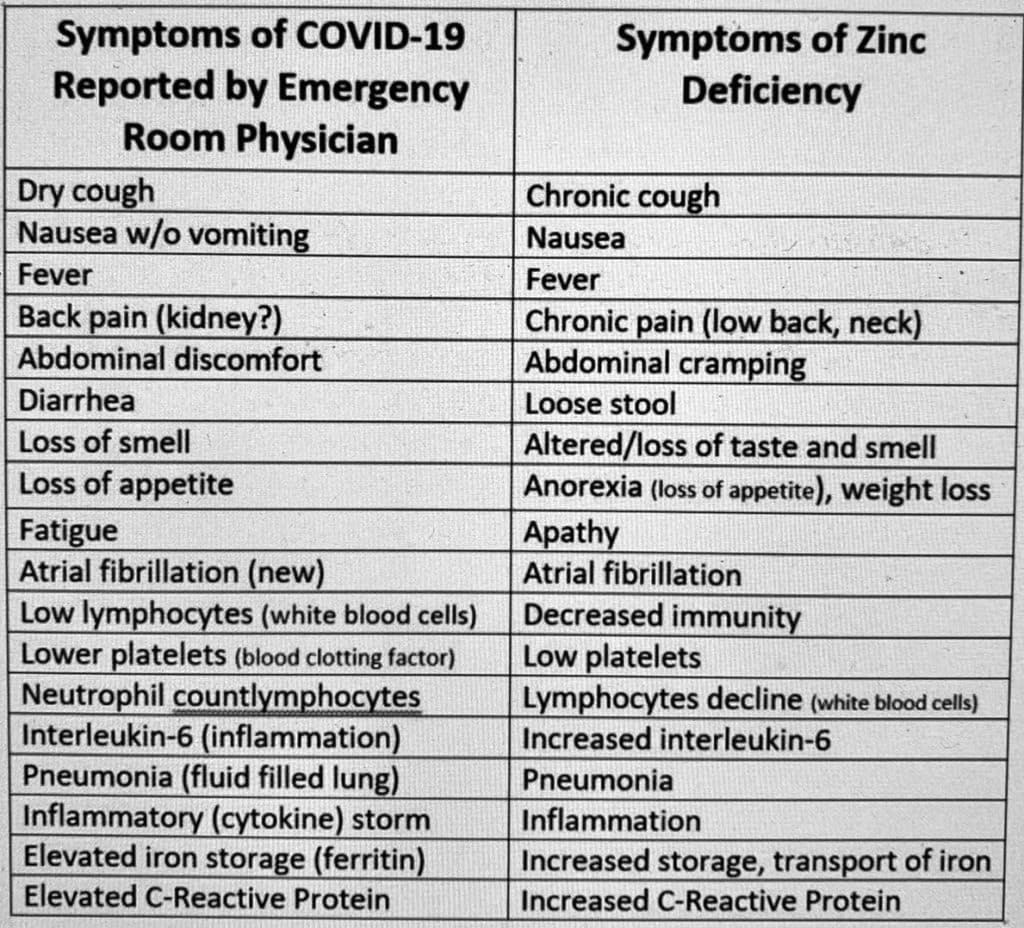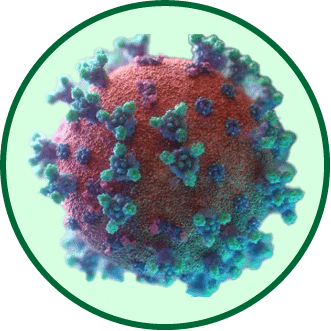Lesson 2 - Managing COVID-19 Symptoms
Identifying common COVID-19 symptoms is crucial for effectively managing your health.
While symptoms can vary from person to person, there are several common signs to look out for.
By recognizing these symptoms, you can take the necessary steps to protect yourself and others.
1. Fever: One of the most common symptoms of COVID-19 is a fever.
If you have a temperature of 100.4 degrees Fahrenheit (38 degrees Celsius) or higher, it is advisable to monitor your symptoms.
Understand that your body is fighting infection by raising your temperature and this is natural.
HEALTH HACK: Apply a flexible cold pack to the back of your neck where it meets your skull to cool your brain and drink plenty of liquids to avoid dehydration.
2. Cough: A dry cough is another prevalent symptom.
It is characterized by a persistent cough that does not produce phlegm or mucus.
HEALTH HACK: Gargle with baking soda dissolved in water or diluted chlorine dioxide.
Manuka honey cough drops with eucalyptus are helpful and taste great.
3. Shortness of breath: Difficulty breathing or shortness of breath can occur with COVID-19.
HEALTH HACK: put eucalyptus oil into a bowl of hot water and a towel over your head to make a sauna effect and breath slowly and deeply until the heat is gone.
Mix 3% hydrogen peroxide with water and use a nebulizer while breathing in the mixture.
Alternatively, put the liquid in a spray bottle and mist it into your mouth and nostrils as you breath in.
4. Fatigue: Feeling unusually tired or exhausted is a common symptom of COVID-19.
HEALTH HACK: avoid sugar and drink black coffee with butter or tea with lemon.
Get some fresh air and sunlight on your face without dark glasses while you take a short walk.
5. Muscle aches: Muscle pain or body aches can occur in COVID-19 cases.
HEALTH HACK: take a warm bath to relax muscles before sleeping.
6. Sore throat: While a sore throat can be caused by various factors, it is also a symptom of COVID-19.
HEALTH HACK: Gargle with baking soda dissolved in water or diluted chlorine dioxide.
Manuka honey cough drops with eucalyptus are helpful and taste great.
7. Loss of taste or smell: Many COVID-19 patients experience a loss of taste or smell.
HEALTH HACK: use high quality aroma oils in a diffuser to stimulate your olfactory sensors.
8. Headache: Headaches can be a symptom of COVID-19, especially when combined with other symptoms.
HEALTH HACK: put your hands behind your head and use your thumbs and fingers to massage your neck muscles and allow more blood flow to your brain.
9. Diarrhea: loss of water results in dehydration
HEALTH HACK: Try ivermectin for parasites, drink bone broth soup and electrolyte powder added to water to rehydrate.
10. Nausea with vomiting: difficulty keeping food down reduces strength.
HEALTH HACK: Use anti-nausea CBD cannabis oil, which will also help you relax and sleep.
Try bone broth soup and electrolyte powder added to water to rehydrate.
It is important to note that these symptoms may also be present in other illnesses and zinc deficiency.
If you experience any of these symptoms and they don't respond to medical treatments outlined in this lesson for more than a week, contact a healthcare professional for further guidance.
Early treatment and remaining calm are important. In most cases staying at home and resting while you take measures to support your immune system, will result in noticeable benefit and recovery.
Additional symptoms can include: tinitus ringing in the ears, motor control difficulty, concentration difficulties, sleep difficulties, mood disorders, chest tightness/pain, hearth palpitations, cognitive impairment, motor deficits exercise intolerance, dyspnea shortness of breath, new onset of diabetes, and new onset of hypertension.
Melatonin, a sleep hormone, is available as a health supplement in 3mg, 5mg, 10mg tablets and has been shown to have beneficial effects. Try 1mg per 10 kg body weight daily.
Diluted 3% hydrogen peroxide found in supermarkets and pharmacies can be used in a nasal wash, inhaled through a nebulizer, or added to a bowl of hot water and breathed in with a towel over your head to provide respiratory relief.
Asthma inhalers such as budesonide contain corticosteroid that can rapidly improve respiratory symptom recovery.
It is essential to carefully follow the recommended dosage and consult with a healthcare professional if you have any concerns.
A 2015 Harvard study, "Nicotine is not additive" found that nicotine, which can also be found in nightshade vegetables such as eggplant, is not addictive without a chemical called "pyrazines" (among 600 approved synthetic chemicals, many that are carcinogenic) added to cigarettes.

A January 2023 study showed the "long Covid" symptoms responded well to nicotine patches.
https://www.ncbi.nlm.nih.gov/pmc/articles/pmid/36650574/
Nicotine gum, 2mg, four times per day for up to 6 days of use has been shown to provide relief from symptoms.
The smallest nicotine patch, 7mg, used for up to 6 days can also provide relief by binding to spike protein receptor sites.
Alternatively, buy a larger patch and cut it into smaller pieces.
When starting to use it will cause the release of toxins so you may feel sick.
Please keep in mind that pandemic recommendations by even the World Health Organization have simply been to stay home and rest when you feel ill and wash your hands frequently.
Mild hand soap is all you need as repeated use of alcohol washes will remove protective oils and beneficial bacteria from your skin allowing microbes to enter more easily.
Scientific examination has shown that viruses are actually not alive and appear to be a form of cellular communication similar to exosomes.
Therefore, you can't kill them with synthetic pharmaceutical drugs and alcohol hand sanitizers, and will only weaken your immune system with poisons.
Common illnesses are often simply a result of a weakened immune system, environmental toxins, harmful bacteria growth or parasites found in your food or water.
For example, a recent medical study of preserved tissue samples from the famous Spanish Flu of 1918, co-authored by well known Dr. Anthony Fauci, found that bacterial pneumonia was actually the primary cause of death.
Mandatory cloth mask wearing at the time provided no protection from something as small as a virus, and only served to collect a harmful amount of live bacteria in breath moisture.
Therefore, it's easy to see how this became a respiratory health illness, with misguided medical recommendations resulting in many deaths, and being mistakenly attributed to a flu virus.
The latest protocols for recovery of the COVID-19 spike protein have been developed by leading doctors and researchers and published in a medical journal.
Now you can follow these guidelines with confidence.
The Journal of American Physicians and Surgeons features a newly published research study that recommends a supplement and nutrition protocol for recovering from COVID-19.
The title is Clinical Rational for SARS-CoV-2 Base Spike Protein Detoxification in Post COVID-19 and Vaccine Injury Syndromes.
The recommended protocol includes the following:
Bromelain - 500 milligrams orally once a day without food
(can also be found in the core of pineapples so use them in your smoothies)
Nattokinase - 2,000 fibrin units (100 milligrams) orally twice a day without food
(Natto -fermented soy beans- common in Japanese diet promoting good gut health)
Curcumin - 500 milligrams orally twice a day (nano, liposomal, or with piperine additive suggested)
These ingredients are available from the Wellness Company, founded by Dr. Peter McCullough who published the research article referenced above. You can buy them separately from your nearest health food store or specially formulated with a number of other ingredients in a groundbreaking product called "Spike Support," which is highly recommended.
Get 10% off with the code HEALTH10 or click the link https://www.twc.health/health10 to view their high quality product line that includes a COVID EMERGENCY KIT and GENERAL HEALTH EMERGENCY KIT as well as many of the additional supplements listed below.
These additional supplements are also recommended by many doctors with experience in treating COVID-19 patients.
Vitamin C - 2,000 milligrams per day as a preventative - 5,000 milligrams per day for recovery
Vitamin D3 - 5,000 international units per day without sunshine as preventative, 10,000 to 20,000 IU per day for recovery
Zinc - 50 milligrams per day as a preventative, 100 milligrams per day for recovery
Quercetin - 400 to 600 milligrams daily (with zinc if ivermectin or hydroxchloroquine are not available)
N-acetylcysteine - 400 to 1,000 milligrams per day depending on your weight 50 to 100 kg
Ivermectin - 12 milligrams daily for a 100 kg person to recover or once a week as a preventative
Hydroxychloroquine - 200 milligrams daily for a 100 kilogram person to recover or once a week as preventative
Selenium - one tablet per day
Irish sea moss - one capsule per day
Green tea extract (Camillia sinensis) - one tablet per day
Nigella sativa (black cumin) - one capsule per day
Dandelion extract (Taraxacum officinale) - one capsule per day
Glutathione - 200 milligrams per day
Combining some or all of these safe, healthy, natural medicines and nutritional supplements will support your immune system health and help to dissolve the harmful spike proteins associated with COVID-19.
The Front Line COVID Critical Care Alliance (www. flccc.net) has issued their recommended prophylaxis and treatment protocols for COVID.
The Alliance has included ivermectin in both preventing and treating COVID-19. Other agents in their protocols include vitamin C, vitamin D3, quercetin, and zinc.
If you are experiencing these symptoms the recommended protocol is twice daily, in the morning and at night before sleep:
50 milligrams of Zinc, 200 milligrams of Quercetin, 2,000 milligrams of Vitamin C and 5,000 international units of Vitamin D3
Zinc deficiency is also a common problem for people eating a processed food diet, which could be misdiagnosed as Covid-19 symptoms.

The next chart illustrates how symptoms of COVID-19 are similar to Zinc deficiency.
Some medical investigations found that up to 99% of COVID-19 cases were actually misdiagnosed, which unfortunately served to create a form of false alarm health emergency.
For those of you listening to this lesson the common symptoms with zinc deficiency are as follows: Dry cough, nausea, fever, chronic pain, abdominal discomfort, loose stool, loss of taste or smell, loss of appetite, and apathy.
The additional common symptoms can only be determined with medical testing.
These safe and effective medical protocols will also help if you have been vaccinated and are feeling some unwanted side effects.
Unfortunately, the mRNA in COVID-19 shots is not the "messenger" type, as used in previous cancer research, but "modified RNA", which has been shown in medical studies to actually change your DNA.
The official strategy of the COVID-19 "vaccines", which are technically "experimental gene therapy injections", is to instruct your body's cells to produce the harmful spike protein.
The problem with this strategy is it causes your body to attack itself, and in earlier research with animals resulted in "cytokine storm" over-reaction, with a uniform fatal outcome for every type of animal.
We are very sorry to inform you that these negative results were well known, and yet the uniform decision was made among authorized drug companies, to skip animal trials and go straight to human use for the COVID-19 injections.
Fortunately, a 3-day water fast has been shown to detox the harmful spike proteins and reset our natural immune system.
Intermittent fasting of 18 hours with only water and eating 2 meals within a 6-hour window is effective as a gradual way to detox.
Once you enter a metabolic state of Ketosis, where your body is burning fat and you don't feel hungry, try eating just one big meal at dinner time with a small amount of meat and large amount of fresh vegetables.
Don't overcook the meat and lightly steam your vegetables for easy digestion.
This process could take from 3 to 6 weeks depending on your metabolism and how effectively you can avoid processed sugar and carbohydrates that convert to sugar.
Then after one to three weeks of eating one main meal a day, try extending your fast to two days and then three days.
Diabetics need to consult your doctor, monitor blood sugar levels and correspondingly adjust insulin, to gradually reduce intake and improve insulin receptor sensitivity and leptin signalling, toward a return to normal function.
It is important to understand that foods such as bakery items, which combine sugar and wheat gluten, will cause an 8-fold blood-glucose response, and damage insulin receptor sensitivity.
Pregnant women should also consult your physician and gradually transition to ketosis with two meals per day.
Nutritious natural pink Himalayan or sea salt intake daily is essential for brain and vital organ development of the fetus, while completely avoiding harmful commercial byproduct white table salt.
It is helpful to understand that our ancient ancestors' diet was 70% fat from animals, and 30% glucose (sugar) from fruits and berries.
Unfortunately, our modern diet has been reversed, 70% sugar and 30% fat, which promotes metabolic dysfunction, obesity, heart disease, diabetes and cancer.
Therefore, intermittent fasting and fat-burning ketosis are actually closer to the natural state that our body functions well with.
The following article by Dr. William Makis contains more supporting information on the benefits of fasting for COVID-19 recovery.
The goal of this short article is to introduce the idea of prolonged fasting as a powerful means of getting rid of the toxic spike protein and spike protein damaged cells, in those who are either COVID-19 vaccinated or suffering from long COVID.
The key process to eliminating spike protein via fasting is: autophagy, (pronounced aw-taw-fo-jee)
Autophagy only starts to get activated around 24 hours of fasting, with a maximum effect around 72 hours, a 3-day fast, beyond which there are diminishing returns.
I also believe that a dysfunctional immune system is the driving force behind most COVID-19 vaccine injuries.
Interestingly, a reboot of the immune system also requires a 72-hour fast.
Finally, stem cell production that occurs during a 72 hour fast can also contribute to repairing the damage done by the COVID-19 spike protein.
COVID-19 Spike protein damage:
Spike protein creates blood clots, damages blood vessel walls and causes inflammation
Spike protein damages mitochondria (causes decreased energy production and accumulation of reactive oxygen species)
Spike protein blocks damaged mitochondria (cellular energy production) from being cleared by the body
Spike protein creates aggregates of abnormal proteins
spike protein fragments can produce amyloid proteins
spike protein destroys gut microbiome
spike protein causes severe immune system dysfunction, which can lead to autoimmune diseases and cancer
Autophagy is the body’s way of removing abnormal proteins, damaged cellular components and damaged cells.
It is stimulated by fasting, heat therapy (sauna), ozone therapy, and hyperbaric oxygen therapy.
Autophagy is also stimulated by: coffee, resveratrol, turmeric and metformin.

Fasting:
There are two main categories of fasting:
prolonged fasting (lasting for at least 36 hours)
intermittent fasting (shorter fasting periods of 12 to 24 hours)
There are several goals of prolonged fasting:
1. Remove as much spike protein from the body as possible via autophagy of cells that express the spike protein
2. Remove spike protein aggregates, amyloid proteins, prions, other abnormal or misfolded proteins that can cause disease
3. Reboot the immune system and produce new immune cells
4. Improve gut microbiome
5. Improve mitochondrial health and function, create new mitochondria
6. Stimulate stem cell production
7. Benefits of Fasting over a 72-hour period are explained step by step in this video by Dr. Jin W. Sung
This video focuses on a 72-hour fasting program and includes Questions & Answers
Dr. Sten Ekberg is a former Olympic decathlon athlete. He reviews fasting benefits over time



The benefits of fasting on COVID-19 vaccine injuries, are now being looked at seriously in the scientific literature with a number of new papers coming out. Here are some references for further reading.
June 19, 2023 - Matthew Halma et al - Exploring therapeutic applications of Autophagy in spike protein related pathology
May 17, 2023 - Matthew Halma et al - Strategies for the Management of Spike protein related pathology
Dec. 2022 - Horne et al - Association of period fasting with lower severity of COVID-19 outcomes
March 2022 - Bhatti et al - The impact of dawn to sunset fasting on immune system and its clinical significance in COVID-19 pandemic
We hope that this detailed information will give you the confidence to try fasting if you have never done it before.
If you wonder why your family doctor never told you about the benefits of fasting, please understand that the Physician's College controls what doctors are allowed to tell their patients and what drugs they should prescribe for various symptoms.
Since MD licenced medical doctors do not receive any significant amount of training on nutrition and natural treatments like fasting, where there is no profit in selling anything to patients, they cannot legally give advice or recommendations and risk losing their medical license.
Imagine going to the doctor for virtually any illness and being told to stop eating for a day and come back tomorrow if you don't feel better.
Then being told the same thing again the second day and the third day.
It would follow the first rule of medicine to do no harm, but it is not a profitable business model for the pharmaceutical industry and diminishes the role of doctors who are expected to provide medicine.
Unfortunately, Pfizer's bio-distribution study shows the vaccine mRNA doesn't just stay in your shoulder muscle as intended, but also gets into your vital organs, reproductive organs and bone marrow.
If the person giving your injection didn't "aspirate" the syringe, pull out the plunger to see if the needle had hit a blood vessel and blood comes into the mixture, then you may have received the concentrated formula directly into your blood stream.
This can cause serious side effects within hours or days.
In some people it may not become apparent for weeks or months and this is why the recovery protocols are so important.
It is worth noting that if any "off-the-shelf" approved medications like asthma inhalers, hydroxychloroquine or ivermectin with decades of safe, effective use were available to the public, it would not be possible to get an "emergency use authorization", EUA, for the experimental COVID-19 vaccines.

To support the EUA for vaccines, the general public was bombarded by globally coordinated mainstream media "disinformation" and corporate propaganda.
One example is a CNN live TV news story that falsely claims President Trump is wrong in so many ways about hydroxychloroquine, which has been used billions of times for over half a century with an excellent safety profile.
However, later on CNN was forced to post a correction to its earlier "misinformation" when a famous study found hydroxycholoroquince helped patients survive coronavirus better.
Unfortunately, many people were harmed and died as a result of such negative publicity campaigns against early treatment at home with inexpensive, effective medications, previously approved by regulatory agencies.
In line with industry estimates of over 70% of television advertising revenue coming from pharmaceutical companies, many news stories promoted expensive and sometimes extremely harmful treatments, along with waiting for the vaccinations, as the only available options.
When we consider that the risk for healthy people getting seriously ill from COVID-19 was less than 0.1% for the elderly, and as low as 0.003% for young people, typical of the seasonal cold and flu, then taking some vitamin C and D3 and getting fresh air and sunlight on your skin, exercise and plenty of rest, were all anyone needed to do to avoid serious illness.
Cancer patients who were using very high levels of Vitamin D3 in their treatments were able to avoid getting sick from influenza and COVID-19, due to its natural immunity boosting properties.
Abundant medical research has shown the amazingly positive benefits of D3, which is created for free with cholesterol in your skin receiving UV light naturally from the sun.
For example, just 20 minutes per day with sunlight on your forearms while you go for a walk, ideally twice a day to move your lymphatic fluid and detox harmful toxins from you body, is generally enough Vitamin D3 to maintain good health.
Unfortunately, promotion of poisonous cholesterol lowering medications causing cellular dysfunction, and toxic sunscreens used on the skin, serve to weaken the immune system and inhibit the body's natural healing mechanism of vitamin D3 production.
It is helpful to understand that vitamin D3 is actually a growth hormone, necessary for vital organ development, which regulates over 3,000 genes, turning on the good ones and turning off the bad ones.
Moderate amounts of natural sunlight are actually anti-cancer, due to beneficial vitamin D3 production.
Rest and hydration are also essential components of managing COVID-19 symptoms.
Your body is fighting to combat the illness, and adequate rest is crucial to support this process.
Resting allows your body to allocate energy towards reducing inflammation, and promoting healing.
It also helps to minimize the risk of complications and allows your immune system to function optimally.
Aim for at least 7 to 9 hours of quality sleep each night and listen to your body's cues for additional rest during the day.
Hydration is equally important as it helps maintain the balance of fluids in your body, supports your immune system, and aids in the elimination of toxins.
Drinking plenty of fluids, especially water, helps to prevent dehydration and keeps your body functioning at its best.
When managing COVID-19 symptoms, try to drink at least 8 to 10 glasses (64 to 80 ounces) of fluids daily. This can include water, herbal teas, clear broths, and electrolyte-rich drinks.
Avoid excessive caffeine and alcohol consumption, as they can contribute to dehydration.
If you find it difficult to consume enough fluids, try incorporating hydrating foods into your diet. Include fruits and vegetables with high water content, such as watermelon, cucumber, oranges, and strawberries.
These not only provide hydration but also supply essential vitamins and minerals to support your recovery.
Remember, rest and hydration are crucial aspects of managing COVID-19 symptoms.
By prioritizing these, you can support your body's healing process and promote a faster recovery.
Thank you for your participation in this lesson. We hope that the knowledge you have gained will contribute to your recovery and overall well-being.
A more detailed version of this lesson with additional recommendations is available in our Deep Dive course if you are interested to know more.
Please update your Personal Progress Profile, PPP, and note any changes to the symptoms you are experiencing and rate their severity from 1 to 10.
Make a note of the recommended medicine and supplements you are able to buy and add to your daily recovery routine.
Try to begin intermittent fasting of 18 hours per day by skipping breakfast and drinking black coffee or tea, having two light meals within 6 hours, and not eating late in the evening.
As fat-burning ketosis begins your hunger pains will stop and you can work towards one meal a day at 24 hours, then 48 and eventually 36 hours with water and vitamins to achieve the benefits of autophagy.
This can be repeated once a month during your recovery journey from serious illness.
It will get easier with practice and is very important to reboot your immune system.
Due to the increasingly high level of environmental toxins now contaminating our air, food and water, simply not eating is an effective, natural healing technique that is free for anyone to try.
Now remind yourself of your goals... and say them out loud...
I'm going to regain my health! I'm going to be okay!
Now smile and hold the positive image in your mind. Show your body the direction it needs to go.
When you achieve your mission accomplished goals we are going to celebrate!


